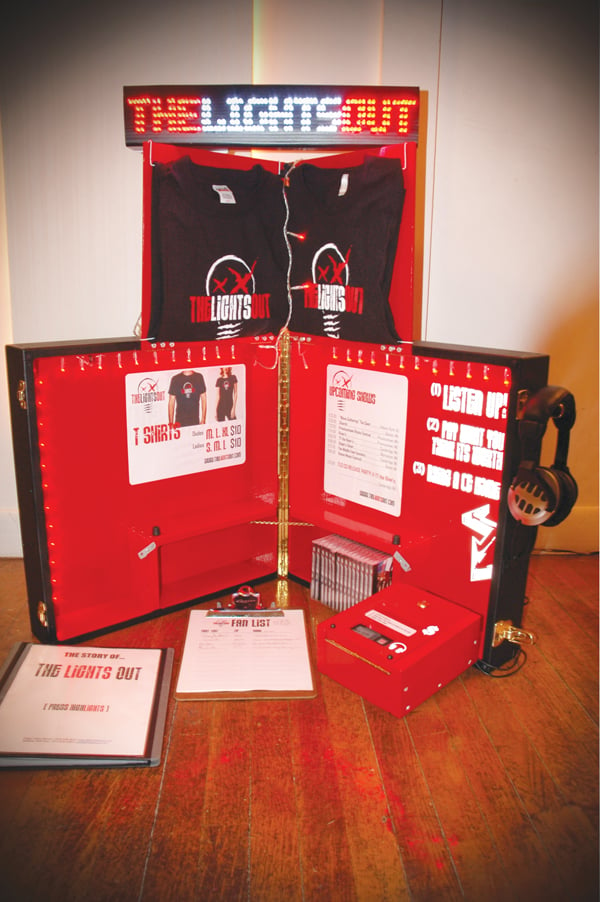Bootleggers Beware: Your Band’s Guide to Slaying Counterfeiters
MERCHANDISING HAS NEVER BEEN EASIER. Online resources have made the process of designing and manufacturing t-shirts, stickers, vinyl, etc. straightforward, fast, and relatively cheap. The downside, however, is that counterfeiters also have this luxury and – as a result – it has never been easier to manufacture and sell bootleg merchandise. While bootlegs were previously only a problem for mega-acts, smaller touring groups have reportedly seen a recent increase in counterfeiting online and at shows.
Can A Bootlegger Sell Your Merch Without Permission? Short Answer: No. The law protects your band’s copyrights, trademarks, and likeness rights. Here is a snapshot of each:
Copyright. Copyright violations arise when a bootlegger uses your band’s music, artwork or photos without authorization. Copyright is a legal protection for those who create “original works of authorship.” This extends to all images and essentially allows the copyright holder to control the rights to their work. No formal filing or paperwork is required for the existence of this protection: it is protected upon creation. So what does this mean for you? Essentially, someone has your expressed permission (called a “license”) to use your copyrighted material, they are violating the copyright laws. This protection is not limited to artists within this country alone. Due to international agreements, artistic works are mutually protected in nearly every country in the world.
Trademarks. A trademark is a word, phrase, or other symbol used in commerce to identify your brand, product, or identity. In the music industry, a trademark exists for the protection of bands, labels, related businesses, and consumers by giving the creators and/or owners of products or services exclusive rights to use a certain name, word, or image to identify their products or services (and prevent others from using them). In addition, it protects consumers by ensuring that when they buy a product (like a piece of merchandise), they know they’re getting the real thing.
Right of Publicity. In addition to stealing a copyrighted work, a bootlegger is breaking the law if they use your band’s name, likeness, or personal attributes without permission. The right of publicity controls the commercial use of your identity/image. Again, a merchant must have your consent to use a legally protected name or likeness of another for commercial gain.
If a bootlegger is found to have violated any of these rights, they can be held liable for statutory damages (between $750 and $30,000), actual damages and profits, or – in rarer circumstances – criminal penalties.
PROTECT YOUR BAND AGAINST BOOTLEGGERS.
1. Register Your Materials. While the law will give you certain protections automatically, in order to have legal action against bootleggers, you need to register your work.
2. File for a Trademark. Your band may have already acquired trademark protection through common law (which is harder to determine and by no means foolproof); however, formal registration is hands down the way to go. The advantage of registration is that (1) it puts potential bootleggers on notice that your band’s name is “taken” and (2) it allows you to sue in federal court if a dispute arises. There are some qualifications you will need to check off prior to registering. First, have you participated in “interstate commerce” (i.e. toured or sold your music in several states)? Second, do you have proof that your name has been used in commerce? If you’ve answered “yes” to both of these questions, you may begin the registration process. Make sure your name and any designs are locked down. First, go to tess2.uspto.gov and conduct a search for similar marks. Second, it is strongly recommend that you look through the full application process at www.uspto.gov/trademarks/teas/new_teas_plus.pdf, which has screen shots of all the questions and information needed throughout the process.
3. Register your Copyright. First, to check out the step-by-step tutorial on registering your work online, go to www.copyright.gov/eco/eco-tutorial.pdf. You’ll need to get all of your songs, composition names, and payment information together. From there, go to www.copyright.gov and click on the “Electronic Copyright Office” logo on the right side of the screen. You will have to complete a brief registration, after which you’ll be taken to the registration home screen. Click “register a claim” on the left and complete the next three steps: (1) Complete Application; (2) Make Registration Payment; and (3) Submit Your Work.
Note: If you want the assurance that your registration is completed properly, hire an attorney specializing in trademarks and copyrights.
4. Ward Off Offenders. There are many options you can take if you find someone selling bootlegged merchandise without permission. Your a first line of defense should be to call the police. It is likely that these vendors do not have proper permits to sell merchandise and will be scared off or cited on that basis alone. This also creates a record in the event that further action need be taken. To that end, if a person or company is repeatedly bootlegging your band’s merch, you’ll need to take legal action to stop them, first for an injunction (an order to cease their illegal activities) and second for damages caused from the prior sales.
If this is an issue for your band, contact a lawyer in the area where this is happening that specializes in intellectual property and litigation.
Adam Barnosky is a Boston-based attorney and writer. For music industry news, entertainment law updates, or to suggest an upcoming Legal Pad topic, find him on Twitter @adambarnosky.
Disclaimer: The information contained in this column is general legal information only. Consult your attorney for all specific considerations.

